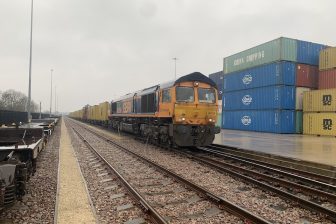DB Netz CEO regrets Rastatt effects
The head of German rail network manager DB Netz has expressed his ‘regret’ for the knock-on problems caused to rail freight stakeholders by this summer’s Rastatt landslip incident. CEO Frank Sennhenn told a summit of European intermodal operators that the company was taking measures to ensure a repeat scenario was avoided.
Sennhenn was speaking at an event organised by Swiss intermodal operator Hupac, at which Rastatt was the main topic on the minds of representatives of rail undertakings, line managers, terminals and transport ministries. The aim of the discussion was to ensure lessons were already being learned and the rail system overall was being enhanced.
Deficiencies
Hupac says the Rastatt crisis had brought the intermodal logistics community together for a cross-sector gathering which attracted more than 200 stakeholder representatives. Bernhard Kunz, CEO of Hupac, told the audience: “We need to take this opportunity to tackle some well-known deficiencies in order to improve market conditions and promote modal shift.”
The collapse of 150 metres of track in August and resultant closure of the Rhine Valley line for several weeks led to one of the biggest logistical crises Europe has faced in years. While rail diversions through Germany, France and Austria could cover barely one third of the demand, the roads and rivers were also quickly overloaded and could not offer sufficient capacity. Entire supply chains broke down and in some cases production of goods ceased completely.
Contingency
DB Netz has been strongly critcised for its handling of the incident, and Frank Sennhenn acknowledged that the line disruption had challenged the entire sector, both organisationally and economically. He expressed his ‘regret’ for this, and assured the audience that the company would promote measures for making improvements at an international level. Future incidents like this, he said, must be handled based on an ‘off-the-shelf’ contingency plan approach. This should include a team of national incident managers, pre-defined re-routings, fast capacity allocation and pre-planned mititgation measures such as diesel locomotives and interpreter services.
“The whole sector has to double its efforts to make rail freight more flexible in daily business and especially during incidents – Rastatt is an opportunity, and we invite all stakeholders to join us on this journey,” he said.
Michall Stahlhut, CEO of SBB Cargo International, described Rastatt as an opportunity to switch ‘from survival into change mode’. The incident, he said, had provided clear evidence of the need for a consistent international infrastructure management from a single, coordinated source, for both day-to-day operations and in the case of any unplanned incidents like what happened. “Infrastructure capacity needs to be secured to 100 per cent in case of planned track works and to 80 per cent in case of disruptions. The improvement of interoperability throughout Europe is the basis requirement for sustainable rail freight services.”
Harmonisation
On the policy front, Peter Füglistaler, Director of the Swiss Federal Office of Transport, said he strongly supported a truly European approach to rail freight transports. The economic impacts of disruptions, he said, ‘trespass national and corporate spheres’ of infrastructure managers, and need to be coordinated internationally with all affected stakeholders. Transport ministries, he added, should focus their investments on rail freight capacity and technical harmonisation and pursue effective international coordination.
The summit also heard from those along the wider supply chains, including Barbara Hoyer of BASF, Joep Brekelmans of Sabic and Wim Blomme of P&O Ferrymasters. Blomme posed the question: “Where are the contingency plans of rail, where is the agility required to support the supply chain at all times? When incidents happen, the persons responsible should not shy away of assuming their responsibility so that confidence can be restored.”
Cooperation
Rudolf Büchl, Head of the infrastructure management arm of SBB Swiss Railways, confirmed that several measures regarding capacity increases, timetabling, construction site coordination, operations and crisis management were already being implemented. These were based on agreements back in June between the Rhine-Alpine corridor infrastructure managers and a separate one between SBB and DB Netz. “We are performing the Rastatt follow-up together with DB Netz as a tangible example of close international cooperation,” he said. “We are happy to improve international crisis management together with our neighbours on the basis of our experience. And as a multilingual country we have some experience in effective language management, with bilingual operations in the new Gotthard base tunnel.”
Hupac’s Bernhard Kunz said he hoped the company would be able to provide more feedback on the summit’s discussions when it holds its General Assembly in June next year.





